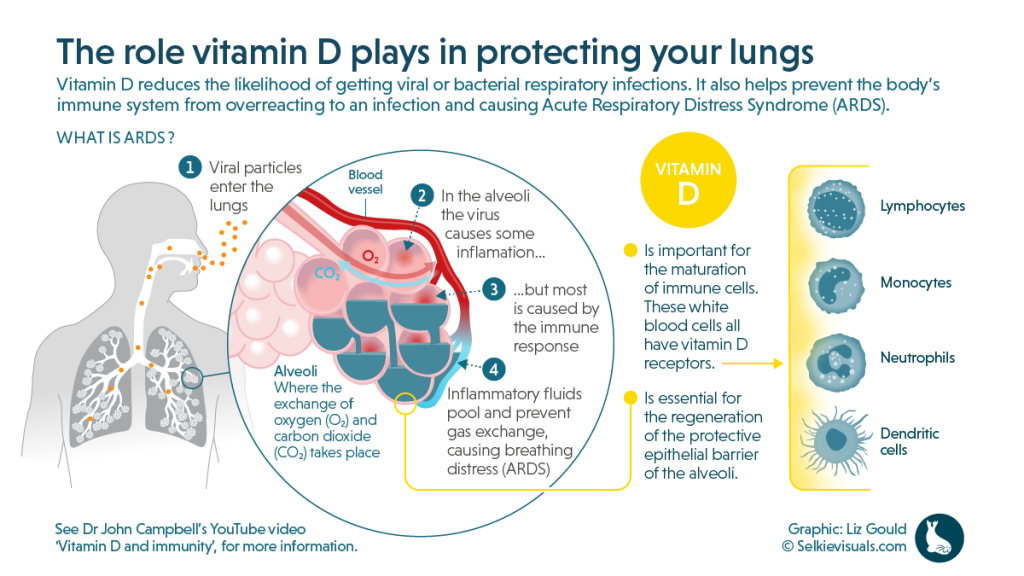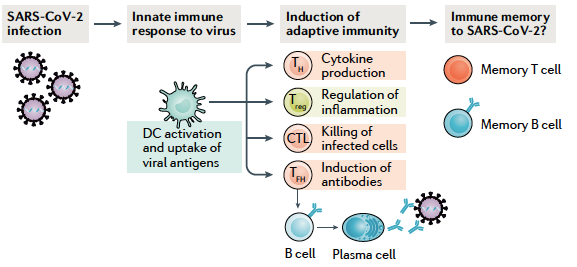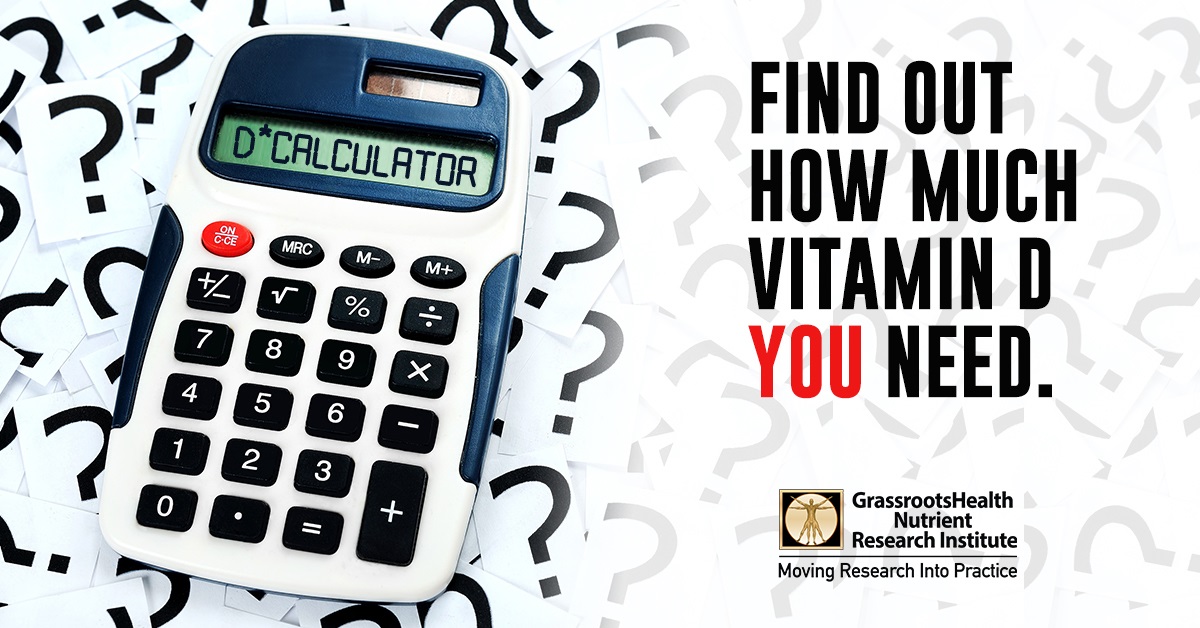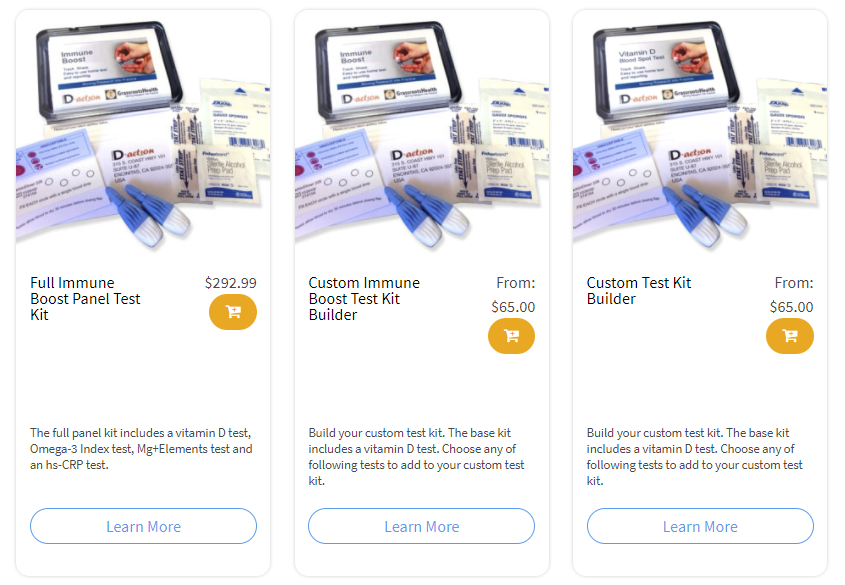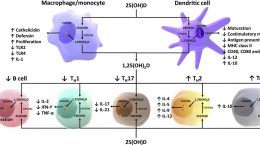Published on October 2, 2020
A simplified review of how vitamin D helps to protect against COVID-19 infection and improve outcomes in those with COVID-19
Vitamin D deficiency has now been shown to increase susceptibility to COVID-19 and increase the risk of COVID-19 severity, including ICU admission and death. Conversely, other published studies have also shown those with higher vitamin D levels (over 30 ng/ml or 75 nmol/L) have a reduced risk of severe symptoms and death due to COVID-19. In fact, an analysis of over 190,000 Americans found that having vitamin D levels of at least 50 ng/ml resulted in a 53% lower positivity rate than those whose levels were less than 20 ng/ml! The first-published randomized controlled trial on vitamin D and COVID-19 found that adding vitamin D to the standard treatment nearly eliminated ICU admissions and did eliminate deaths.
It sounds almost too good to be true… Yet vitamin D is known to influence the expression of thousands of genes and is involved in regulating over 80 biological pathways in the body. Vitamin D is not a miracle drug, nor does it act alone, but it is an important mediator of immune function, and we can largely control whether or not we get enough vitamin D from our daily habits (sun, diet and supplements).
Today we will explain HOW vitamin D acts to protect you from getting COVID-19, and in an upcoming Part 2, we will discuss how vitamin D helps improve symptoms if you do get COVID-19.
Vitamin D is Known to Help Prevent Upper Respiratory Tract Infections
 Vitamin D is known to help fight upper respiratory tract infections. As previously discussed, a large meta-analysis including 25 randomized controlled trials with over 11,300 individuals showed that vitamin D supplementation reduced the risk of respiratory tract infections by 70%. GrassrootsHealth participants with vitamin D levels greater than or equal to 40 ng/mL were 41% less likely to have had the flu and 15% less likely to have had a cold in the prior 6 months than participants with levels less than 20 ng/mL.
Vitamin D is known to help fight upper respiratory tract infections. As previously discussed, a large meta-analysis including 25 randomized controlled trials with over 11,300 individuals showed that vitamin D supplementation reduced the risk of respiratory tract infections by 70%. GrassrootsHealth participants with vitamin D levels greater than or equal to 40 ng/mL were 41% less likely to have had the flu and 15% less likely to have had a cold in the prior 6 months than participants with levels less than 20 ng/mL.
Acute Respiratory Distress Syndrome (ARDS) is a major complication and cause of death among those with serious COVID-19 infections. When comparing vitamin D levels among those with and at risk of ARDS, one study found that 96% of those at risk of ARDS were deficient in vitamin D.
Vitamin D Can Protect Lung Cells from SARS-CoV-2 Attack
COVID-19 is caused by a coronavirus (a specific type of virus) called SARS-CoV-2. Infection of COVID-19 begins when the SARS-CoV-2 virus enters the cells of the lung by binding the angiotensin-converting enzyme 2 (ACE-2) receptor and de-activating it, resulting in inflammation. Vitamin D is responsible for increasing ACE-2 expression, which allows it to carry out its anti-inflammatory actions to help protect the lungs and keep inflammation at bay.
During the early incubation stage when the virus is hijacking the cell there are generally no symptoms. Most people who are infected with SARS-CoV-2 experience mild-moderate respiratory symptoms and recover without any need for hospitalization or therapy. In those who do experience more severe symptoms, only a small percentage have severe enough symptoms for the virus to be life threatening. This difference in both susceptibility (whether the virus is able to invade) and recovery (how well the body fights it off if it does invade) is attributed to the individual’s immune response. Vitamin D may help protect against COVID-19 specifically through maintenance of physical barriers (susceptibility) and regulation of innate and adaptive immunity (mounting an effective immune response to the virus).
The graphic below provides a very clear illustration of several ways vitamin D acts to directly protect the lungs, from its effect on the protective barrier of the lungs, to its involvement in the maturation of immune cells, and its role in regulating the inflammatory response and inhibiting the cytokine storm (which will be covered in more detail in Part 2).
Vitamin D Regulates the Immune Response
Vitamin D plays a crucial role in regulating immune system activity – both innate and adaptive responses. As previously described, the innate immune system is responsible for the initial defensive front with a central role played by phagocytes. Vitamin D stimulates expansion of these phagocytes (monocytes and macrophages) increasing their ability to fight off the virus by increasing their numbers, as well as increasing their killing capacity through stimulating the production of the anti-viral protein cathelicidin. Vitamin D also acts to regulate the maturation of dendritic cells which are important for activating CD4+ T cells and in turn the rest of the immune response.
Earlier studies have shown that in SARS and influenza the adaptive immune cells, T cells and B cells, are vital in defending the body against the virus. Many studies have found this to be the case in COVID-19 as well, with both antibody and cellular defenses being recruited to the fight. Vitamin D is a potent regulator of adaptive immunity, including both cell-mediated (T cell) and humoral (B cell) immunity.
Cox R and Brokstad K, Nature Reviews, 2020.
Click to Download & Print
Once SARS-CoV-2 has been successful at replicating itself and spreading to surrounding cells, mild to moderate symptoms progress (e.g. sore throat, cough, fever and muscle aches) that result from localized and appropriate inflammation, associated tissue damage and antiviral activity of B cells and T cells. CD4+ and CD8+ T cells secrete cytokines (chemical signals that instruct other cells what to do) and are central to the successful elimination of COVID-19, as happens in most people. Unfortunately, more serious symptoms and death can result with an over-reactive or ineffective immune response, as can happen when there is not enough vitamin D for use. The role of vitamin D at this stage will be covered in Part 2.
Thus, vitamin D is important to help fend off an attack by SARS-CoV-2. Ensuring optimal levels of vitamin D is an easy way to help support your immune system response.
Better Results when Taken Together
Nutrients work synergistically in order to carry out specific functions within the body. For example, we have recently discussed how different immune cells rely on a variety of nutrients, including vitamins D, C, B6, B12, zinc, and magnesium, in order to carry out their actions in an immune response. Without these necessary nutrients, immune function may be hindered.
Could a nutrient deficiency be putting a damper on your immune response? Find out by testing your vitamin D, omega-3s, magnesium and other essential elements (including selenium), as well as your inflammation levels, with the new Immune Boost home test kit offered by GrassrootsHealth. Measuring levels is the only way to know if you are supporting your immune system and whether additional changes should be made, with supplementation, dietary changes, or both.
Enroll now with the Full Immune Boost Panel (which includes tests for vitamin D, Omega-3 Index, magnesium, zinc, selenium, copper, and hsCRP), and get 10% off when you use coupon code BoostTen at checkout.
What Does it Take YOU to Get Your D to 40 ng/ml (100 nmol/L)?
Did you know your health could be greatly affected by making sure you have a vitamin D level of at least 40 ng/ml (100 nmol/L)? Help us help you.
STEP 1 – Do you know what your vitamin D level is? If not, be sure to test today to find out.
STEP 2 – Determine your target level. Are you at your target level? Experts recommend a level of at least 40-60 ng/ml (100-150 nmol/L).
STEP 3 – Need to boost your level? Use the D*calculator to see how much vitamin D it may take to reach your target. Opt for the Loading Dose for a quicker boost.
STEP 4 – Optimize how your body absorbs and utilizes vitamin D with co-nutrients and these simple steps.
STEP 5 – Re-Test! This is an important step to make sure you have reached your target level, and to ensure you are not taking too much! Re-testing after 3-4 months is recommended.
STEP 6 – Adjust, Repeat…
Give your immune system the nutrients it needs to support a healthy you and protect yourself from unnecessary diseases, especially COVID-19.
NEWS ALERT
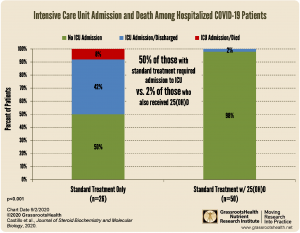 The first Randomized Controlled Trial on vitamin D and COVID-19 has shown a 96% lower risk of ICU admission for those receiving vitamin D (as 25(OH)D to quickly boost vitamin D blood levels) along with the standard treatment, compared to those receiving standard treatment alone.
The first Randomized Controlled Trial on vitamin D and COVID-19 has shown a 96% lower risk of ICU admission for those receiving vitamin D (as 25(OH)D to quickly boost vitamin D blood levels) along with the standard treatment, compared to those receiving standard treatment alone.
These results support many previous observational studies showing a relationship between vitamin D levels and intake and COVID-19 severity.
Review the Latest Nutrient Research for COVID-19
GrassrootsHealth Nutrient Research Institute has launched the new Immune Boost project with the use of our myData-myAnswers nutrient health system that nearly 15,000 people are already using for their health. Specific markers that influence immune health are suggested for testing as part of this project including:
- Vitamin D
- Omega-3 Index
- Essential elements magnesium, selenium, and zinc
- hsCRP
Our goal is to demonstrate how one can use the Nutrient Research Model established by Dr. Robert Heaney to show the effect of vitamin D serum levels of at least 40 ng/ml (100 nmol/L) on risk reduction for all ethnicities in the population. Status and intake of other nutrients will also be analyzed for any type of relationship to immune status and symptom severity. Join the project today!
Please let us know if you’re interested in helping sponsor this project.
CLICK HERE for updates and new information about the project.
Through GrassrootsHealth Nutrient Research Institute, you can also test your essential elements magnesium, copper, zinc and selenium, toxins such as lead, mercury and cadmium, as well as your omega-3 levels, inflammation levels and thyroid stimulating hormone (TSH) level. Find out your levels today! Log on to the test selection page (click the link below) to get your tests and see for yourself if your levels can be improved.
Make sure you track your results before and after, about every 6 months!
Click Here to Access the Test Page
How can I track my nutrient intake and levels over time?
To help you track your supplement use and nutrient levels, GrassrootsHealth has created the Personal Health Nutrient Decision System called
For each specific supplement, you can track what days you take it, how much, and many other details. This will help you know your true supplemental intake and what patterns of use work for you to reach and maintain optimum nutrient levels. Check it out today!


